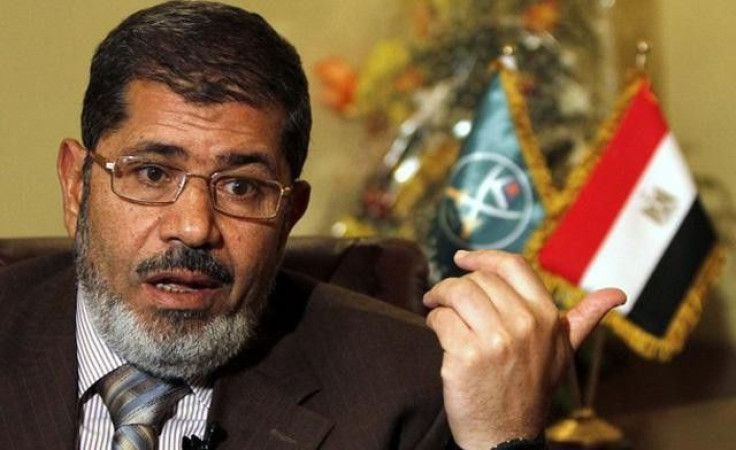Egypt's Rocky Path To Democracy: What Lies Ahead For Morsi?

Everyone has a reason to hate the Muslim Brotherhood, which has been in the limelight ever since the brutally oppressive reign of former President of Egypt Hosni Mubarak ended. The Western mainstream opinion is united against the Brotherhood, an organization that reeks of sinister religious overtones starting from its name, supported suitably by its new-found Islamic-state rhetoric. But radical Islamists in the Middle East condemn the Brotherhood equally, for luring thousands of young Muslim men into lines for elections ... instead of into the lines of jihad, as remarked by Egyptian al Qaeda leader Ayman al Zawahiri.
Despite having been banned for several years under Mubarak's regime, the Brotherhood as an organization, remarkably never denounced the lofty ideals of democracy to join the Jihad. However, it has accommodated extremist members including Sayyid Qutb, whose 1964 work, Milestones, inspired the founders of militant groups including Islamic Jihad and al Qaeda.
Due to varied social and political factors, the Brotherhood is still at crossroads, undecided between the Saudi Arabian style shariah state and the secular, democratic rule of law. Though the Brotherhood managed to get this far by combining political activism and Islamic charity work without getting carried away by extremist ideologues, its leaders simply cannot afford to stay undecided any longer.
Muhammad Morsi, the president-elect from Brotherhood's Freedom and Justice Party (FPJ) says he has plans to restore the confidence of each one of his citizens by being a president to all Egyptians: Muslims, Christians, the elderly, children, women, men, farmers, teachers, workers, those who work in the private and public sectors, and the merchants.
However, Morsi comes across as a deeply religious man, who also happens to have been a member of the anti-Zionist committee in his Nile Delta province of Sharkiya in the late 1980s that promoted rejection of normalization with Israel.
A graduate student at the University of Southern California, Morsi isn’t exactly a formidable figure in Egyptian politics. He came in as a replacement when Khairat al-Shater, the Muslim Brotherhood’s first choice for presidential candidate was disqualified because of his prison conviction during the Mubarak regime. Egyptians feel that Morsi would end up playing second fiddle to millionaire businessman al-Shater, who is the Brotherhood's chief financier and has played a key role in developing the group's economic policy.
Although Morsi, who resigned from the Brotherhood to take the top job, has said that he has plans to change his pro-Hamas, anti-Zionist, anti-Copt tune to transform Egypt into a truly democratic nation, a report published Monday by the Iranian news agency Fars raised concerns in the West and the Middle East. Fars reported that Morsi was planning to reconsider the peace deal with Israel and would build ties with Iran to create a strategic balance in the Middle East, which his spokesperson refuted as being without foundation.
In the event of the report turning out to be authentic, Israel and its allies in the West have enough reasons to be worried, apart from the Egyptian minorities who broke down in desperation when the election results were announced.
Christian Copts, women, moderate Muslims and middle and upper classes heavily supported Morsi's rival, Ahmed Shafiq, who came with a Mubarak stamp, not because they wanted to be reminded of anything about Mubarak, but because they feared being downgraded in the Islamic order under the Brotherhood.
Despite the fears, unavoidable under the present circumstances, Morsi hasn't said anything to raise concerns, except of course the allegedly false story on Egypt tying up with Iran.
He's been saying a lot of the right things, both privately and then you saw him say many of the right things publicly, US State Department spokeswoman Victoria Nuland was quoted as saying Monday by AFP.
So now as he gets inaugurated and begins taking up his duties, he needs to turn those pledges into action, she said.
However, Washington, which supported Mubarak throughout, has made it a point to keep quiet to avoid accusations of interference and bias.
President Obama, who spoke over phone to both Morsi and Shafik on Monday, pledged to work with Egyptian elected government on the basis of mutual respect.
Even if the ideological and political concerns surrounding an Egyptian government led by the Muslim Brotherhood are to be set aside, it remains to be seen how democratically inclined the military led Supreme Council of Egypt will be. The Supreme Council of the Armed Forces (SCAF) last week dissolved the parliament and issued an interim constitution which grants the generals the ability to control the budget and determine who writes a permanent constitution.
The Islamists and the military have been at loggerheads since Feb. 11 last year, a power struggle that could potentially incapacitate the democratic process the country is looking forward to.
Egyptians, as of now, have enough reasons to celebrate. But the road to democracy is dangerously suspended over the abyss of theocracy and police state.
© Copyright IBTimes 2024. All rights reserved.












